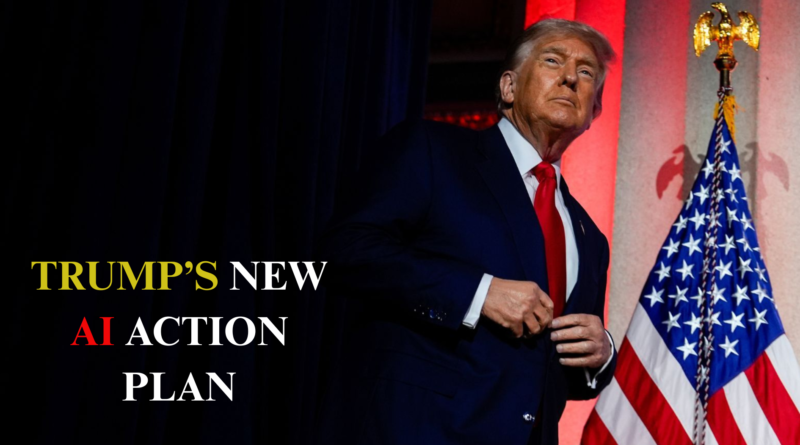TRUMP’S NEW AI ACTION PLAN: A BOLD BID FOR U.S. TECH SUPREMACY
In a major policy shift, former President Donald Trump has unveiled an ambitious Artificial Intelligence (AI) Action Plan designed to reassert U.S. leadership in the global AI race. The initiative, receiving endorsements from tech powerhouses like Google, Meta, Amazon, and Palantir, focuses on building cutting-edge AI infrastructure, streamlining outdated regulations, and forging tighter alliances with international partners. The plan signals a strategic move to reclaim technological dominance in the face of rising global competition, especially from China.
The centerpiece of the plan is a $200 billion public-private investment package aimed at overhauling the nation’s AI infrastructure. This includes the development of high-capacity AI data centers, expansion of semiconductor manufacturing, and subsidies for startups focusing on AI applications in healthcare, defense, and logistics. Industry insiders say this marks one of the largest technology investments in American history and could reshape the AI landscape over the next decade.
Another key pillar is regulatory reform. The plan proposes a national AI framework to replace the current patchwork of state-level and sector-specific rules. The framework would provide clearer standards for AI ethics, data usage, and accountability, while encouraging innovation. Critics argue, however, that the proposed reforms tilt too far in favor of corporations, potentially compromising data privacy and oversight.
On the international front, Trump’s plan includes reviving dormant tech alliances with Europe and the Indo-Pacific region. The proposal seeks coordinated AI research funding, harmonized export controls, and shared cybersecurity protocols. According to Trump’s team, these alliances are essential to counter China’s rapid advancements in AI and to ensure democratic values remain embedded in global technology systems.
Despite the bipartisan appeal of strengthening America’s tech edge, the plan is already generating controversy. Civil rights groups and AI ethicists warn that insufficient safeguards against algorithmic bias could exacerbate social inequality. They cite past cases of facial recognition failures, biased hiring algorithms, and AI-powered surveillance tools that disproportionately harm minority communities.
Geopolitical analysts have also expressed concern that an aggressive AI posture could fuel an arms race with China and Russia. While the plan highlights the need for ethical AI in defense, it also opens the door to expanding military applications, including autonomous drones and battlefield decision-making systems. Critics say such developments raise profound moral and legal questions that remain unresolved.
Tech giants backing the plan are hailing it as visionary. Meta’s CEO Mark Zuckerberg emphasized the importance of national investment in foundational models and responsible innovation. Palantir’s co-founder Peter Thiel framed the initiative as necessary to “defend freedom in the age of artificial intelligence.” Yet, skeptics view their support as self-serving, given the billions in potential government contracts up for grabs.
As the 2024 campaign heats up, Trump’s AI Action Plan is poised to become a defining issue. While it may galvanize support among tech-friendly voters and business leaders, its long-term success will depend on balancing innovation with accountability, and ambition with caution. The stakes are high-not just for the U.S. economy, but for the future of global digital governance.




